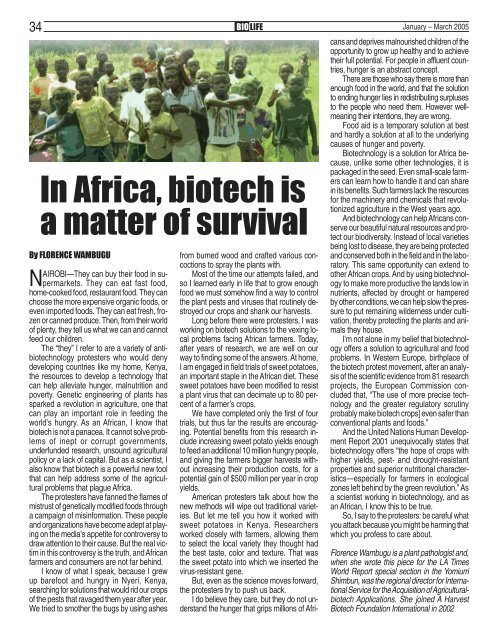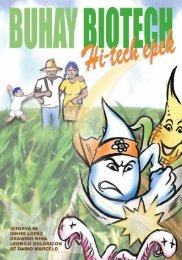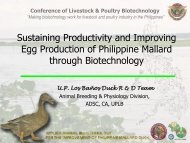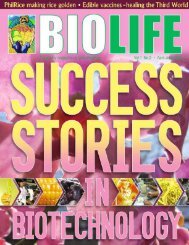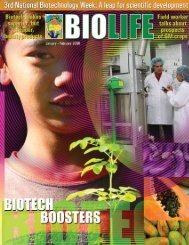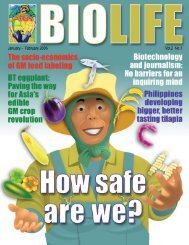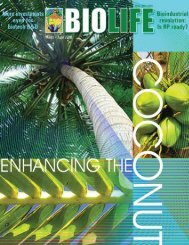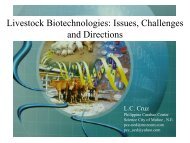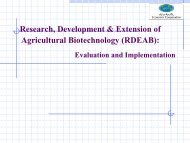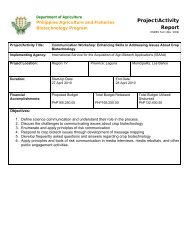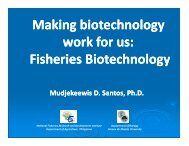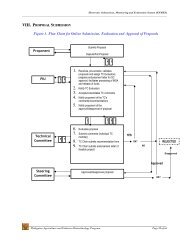Download PDF - SEARCA Biotechnology Information Center
Download PDF - SEARCA Biotechnology Information Center
Download PDF - SEARCA Biotechnology Information Center
Create successful ePaper yourself
Turn your PDF publications into a flip-book with our unique Google optimized e-Paper software.
34 BIO LIFE January – March 2005<br />
In Africa, biotech is<br />
a matter of survival<br />
By FLORENCE WAMBUGU<br />
NAIROBI—They can buy their food in supermarkets.<br />
They can eat fast food,<br />
home-cooked food, restaurant food. They can<br />
choose the more expensive organic foods, or<br />
even imported foods. They can eat fresh, frozen<br />
or canned produce. Then, from their world<br />
of plenty, they tell us what we can and cannot<br />
feed our children.<br />
The “they” I refer to are a variety of antibiotechnology<br />
protesters who would deny<br />
developing countries like my home, Kenya,<br />
the resources to develop a technology that<br />
can help alleviate hunger, malnutrition and<br />
poverty. Genetic engineering of plants has<br />
sparked a revolution in agriculture, one that<br />
can play an important role in feeding the<br />
world’s hungry. As an African, I know that<br />
biotech is not a panacea. It cannot solve problems<br />
of inept or corrupt governments,<br />
underfunded research, unsound agricultural<br />
policy or a lack of capital. But as a scientist, I<br />
also know that biotech is a powerful new tool<br />
that can help address some of the agricultural<br />
problems that plague Africa.<br />
The protesters have fanned the flames of<br />
mistrust of genetically modified foods through<br />
a campaign of misinformation. These people<br />
and organizations have become adept at playing<br />
on the media’s appetite for controversy to<br />
draw attention to their cause. But the real victim<br />
in this controversy is the truth, and African<br />
farmers and consumers are not far behind.<br />
I know of what I speak, because I grew<br />
up barefoot and hungry in Nyeri, Kenya,<br />
searching for solutions that would rid our crops<br />
of the pests that ravaged them year after year.<br />
We tried to smother the bugs by using ashes<br />
from burned wood and crafted various concoctions<br />
to spray the plants with.<br />
Most of the time our attempts failed, and<br />
so I learned early in life that to grow enough<br />
food we must somehow find a way to control<br />
the plant pests and viruses that routinely destroyed<br />
our crops and shank our harvests.<br />
Long before there were protesters, I was<br />
working on biotech solutions to the vexing local<br />
problems facing African farmers. Today,<br />
after years of research, we are well on our<br />
way to finding some of the answers. At home,<br />
I am engaged in field trials of sweet potatoes,<br />
an important staple in the African diet. These<br />
sweet potatoes have been modified to resist<br />
a plant virus that can decimate up to 80 percent<br />
of a farmer’s crops.<br />
We have completed only the first of four<br />
trials, but thus far the results are encouraging.<br />
Potential benefits from this research include<br />
increasing sweet potato yields enough<br />
to feed an additional 10 million hungry people,<br />
and giving the farmers bigger harvests without<br />
increasing their production costs, for a<br />
potential gain of $500 million per year in crop<br />
yields.<br />
American protesters talk about how the<br />
new methods will wipe out traditional varieties.<br />
But let me tell you how it worked with<br />
sweet potatoes in Kenya. Researchers<br />
worked closely with farmers, allowing them<br />
to select the local variety they thought had<br />
the best taste, color and texture. That was<br />
the sweet potato into which we inserted the<br />
virus-resistant gene.<br />
But, even as the science moves forward,<br />
the protesters try to push us back.<br />
I do believe they care, but they do not understand<br />
the hunger that grips millions of Africans<br />
and deprives malnourished children of the<br />
opportunity to grow up healthy and to achieve<br />
their full potential. For people in affluent countries,<br />
hunger is an abstract concept.<br />
There are those who say there is more than<br />
enough food in the world, and that the solution<br />
to ending hunger lies in redistributing surpluses<br />
to the people who need them. However wellmeaning<br />
their intentions, they are wrong.<br />
Food aid is a temporary solution at best<br />
and hardly a solution at all to the underlying<br />
causes of hunger and poverty.<br />
<strong>Biotechnology</strong> is a solution for Africa because,<br />
unlike some other technologies, it is<br />
packaged in the seed. Even small-scale farmers<br />
can learn how to handle it and can share<br />
in its benefits. Such farmers lack the resources<br />
for the machinery and chemicals that revolutionized<br />
agriculture in the West years ago.<br />
And biotechnology can help Africans conserve<br />
our beautiful natural resources and protect<br />
our biodiversity. Instead of local varieties<br />
being lost to disease, they are being protected<br />
and conserved both in the field and in the laboratory.<br />
This same opportunity can extend to<br />
other African crops. And by using biotechnology<br />
to make more productive the lands low in<br />
nutrients, affected by drought or hampered<br />
by other conditions, we can help slow the pressure<br />
to put remaining wilderness under cultivation,<br />
thereby protecting the plants and animals<br />
they house.<br />
I’m not alone in my belief that biotechnology<br />
offers a solution to agricultural and food<br />
problems. In Western Europe, birthplace of<br />
the biotech protest movement, after an analysis<br />
of the scientific evidence from 81 research<br />
projects, the European Commission concluded<br />
that, “The use of more precise technology<br />
and the greater regulatory scrutiny<br />
probably make biotech crops] even safer than<br />
conventional plants and foods.”<br />
And the United Nations Human Development<br />
Report 2001 unequivocally states that<br />
biotechnology offers “the hope of crops with<br />
higher yields, pest- and drought-resistant<br />
properties and superior nutritional characteristics—especially<br />
for farmers in ecological<br />
zones left behind by the green revolution.” As<br />
a scientist working in biotechnology, and as<br />
an African, I know this to be true.<br />
So, I say to the protesters: be careful what<br />
you attack because you might be harming that<br />
which you profess to care about.<br />
Florence Wambugu is a plant pathologist and,<br />
when she wrote this piece for the LA Times<br />
World Report special section in the Yomiurri<br />
Shimbun, was the regional director for International<br />
Service for the Acquisition of Agriculturalbiotech<br />
Applications. She joined A Harvest<br />
Biotech Foundation International in 2002


